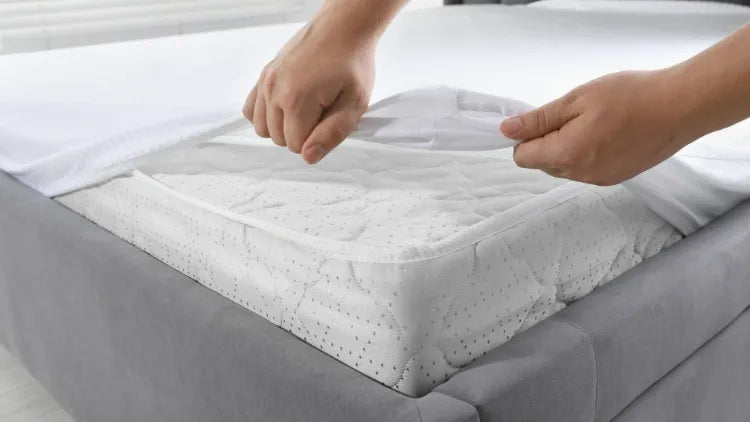Sleep is essential to our lives, but how much do we truly understand about it? From quirky sleep habits to the science behind a cozy night's rest, here are 72 interesting facts and statistics about sleep that will leave you eager to snuggle into your mattress with crisp sheets.
- The average adult needs 7 to 9 hours of sleep per night to function optimally.
- Nearly one-third of our lives are spent sleeping, about 26 years on average.
- The record for the most extended period without sleep, recognized by Guinness World Records, stands at 11 days.
- Mattress quality significantly impacts sleep, with a cozy mattress improving sleep duration and quality.
- Sleep deprivation can lead to weight gain due to increased hunger hormones.
- People who sleep less than six hours per night are at a higher risk for heart disease.
- The most common sleep disorder is insomnia, affecting around 30% of adults.
- Using electronic devices before bed can reduce melatonin levels by 50%, making it harder to fall asleep.
- The body's core temperature drops during sleep, promoting restful sleep on a cozy mattress.
- REM (Rapid Eye Movement) sleep is when most dreaming occurs, and it's crucial for memory consolidation.

- On average, One in five adults sleeps less than six hours per night.
- During sleep, your brain clears out toxins that build up during the day.
- Poor sleep quality is linked to a higher risk of depression.
- Crisp sheets can help regulate body temperature, improving sleep comfort.
- Sleepwalking, or somnambulism, affects about 4% of adults.
- Caffeine can stay in your system for up to 8 hours, disrupting sleep if consumed late in the day.
- Sleep apnea affects over 22 million Americans, with many cases going undiagnosed.
- Newborns sleep 16-18 hours daily in short bursts.
- Sleep boosts your immune system, helping your body fight illness.
- Women tend to sleep longer than men by an average of 20 minutes.

- The ideal bedroom temperature for sleep is between 60-67°F.
- Noise pollution during sleep can increase stress hormones, affecting sleep quality.
- Sleep deprivation can lead to cognitive impairments similar to being drunk.
- Memory foam mattresses are famous for their ability to mold to the body, providing customized support.
- People who sleep on their stomachs are more likely to experience back pain.
- Napping for 10-20 minutes can improve alertness without interfering with nighttime sleep.
- Dreaming helps process emotions and can be a form of overnight therapy.
- Lack of sleep can make you more prone to accidents and injuries.
- Regular exercise improves sleep quality, especially when done in the morning or early afternoon.
- Sleeping on a cozy mattress can reduce pressure points and improve circulation.

- Shift workers often struggle with sleep disorders due to irregular sleep patterns.
- The circadian rhythm is your body's internal clock that regulates sleep-wake cycles.
- Snoring affects 90 million Americans, with 37 million experiencing it regularly.
- People tend to wake up more during a full moon, although the reason is unclear.
- Eating a large meal before bed can cause indigestion and disrupt sleep.
- Your body cycles through four stages of sleep, each playing a crucial role in overall health.
- Light exposure, especially blue light, can delay sleep onset.
- Poor sleep is linked to a higher risk of Alzheimer's disease.
- A cozy mattress and crisp sheets can help reduce sleep disturbances caused by discomfort.
- The smell of lavender has been shown to improve sleep quality in some people.

- The average person dreams about 4-6 times per night.
- People over 65 are more likely to experience sleep problems, including insomnia.
- Sleep helps regulate blood sugar levels, reducing the risk of diabetes.
- Reading before bed can help you relax, but only if it's not on a screen.
- Lack of sleep can make it harder to focus and remember information.
- Mattress firmness is a personal preference, with no one-size-fits-all solution.
- Sleeping on your side can help reduce snoring and improve breathing.
- Nightmares are more common in children, but adults can experience them too, especially under stress.
- Sleep helps with muscle repair and growth, making it essential for athletes.
- Your brain is more active during REM sleep than when awake.

- Falling asleep should take about 10-20 minutes for most people.
- Pets in the bedroom can disrupt sleep, although some people find comfort in their presence.
- Alcohol may help you fall asleep faster, but it disrupts sleep cycles later in the night.
- Over 70% of adults report not getting enough sleep at least once a month.
- Cozy mattresses with good support can reduce the risk of back and neck pain.
- Social jet lag occurs when your body's internal clock is misaligned with your social schedule.
- Sleep debt refers to the gap between the sleep your body needs and the sleep you actually get.
- Power naps of 10-30 minutes can boost energy and productivity.
- The color of your bedroom can impact sleep quality, with blue promoting calmness.
- Chronic sleep deprivation can lead to serious health issues like high blood pressure & obesity.

- Sleepwalking is more common in children, often occurring during deep sleep stages.
- Listening to calming music before bed can improve sleep quality.
- Sleep quality is just as important as quantity; uninterrupted sleep is crucial for health.
- Sleep paralysis, the inability to move while falling asleep or waking up, affects about 8% of people.
- Your mattress should be replaced every 7-10 years for optimal support and comfort.
- Lack of sleep can weaken your immune system, making you more susceptible to colds.
- A cozy mattress topper can add extra comfort and extend the life of your mattress.
- Cognitive Behavioral Therapy (CBT) is an effective treatment for chronic insomnia.
- Temperature changes in your body are a natural part of the sleep cycle.
- Bright light exposure in the morning helps regulate your circadian rhythm.

- Eating a light snack before bed can prevent hunger from waking you up at night.
- Quality sleep on a cozy mattress with crisp sheets can lead to a happier, healthier life.
Sleep Tight: Make the Most of Your Night's Rest
Getting a good night's sleep isn't just about how long you sleep; it's about how well you sleep. A quality mattress, cozy sheets, and the right sleep environment can make all the difference. At Blissful Nights, we are committed to helping you find the best mattress to suit your needs and enjoy all the benefits of restful sleep.
Ready to improve your sleep quality? Explore our range of mattresses and sleep products designed to give you the best sleep of your life.
Frequently Asked Questions
Can a cozy mattress improve sleep quality?
Absolutely! A cozy mattress provides the right balance of comfort and support, crucial for uninterrupted sleep. The right mattress can reduce pressure points, minimize tossing & turning, and help you wake up feeling refreshed.
How does sleep affect mental health?
Sleep is vital for mental health, allowing the brain to process emotions and memories. Long-term sleep deprivation can result in heightened stress, anxiety, and depression. Prioritizing good sleep habits can significantly improve your overall well-being.
Is it better to sleep in a cool or warm room?
A cooler room, ideally between 60-67°F, is generally better for sleep. A lower temperature helps your body cool down, a natural part of the sleep cycle. A room that's too warm can make it difficult to fall asleep and stay asleep.


![72 Facts About Sleep + Statistics [2024] Header](http://www.blissfulnights.com/cdn/shop/articles/HEADER-72-sleep-facts-statistics-2024.webp?v=1725556382&width=1500)


Leave a comment
This site is protected by hCaptcha and the hCaptcha Privacy Policy and Terms of Service apply.